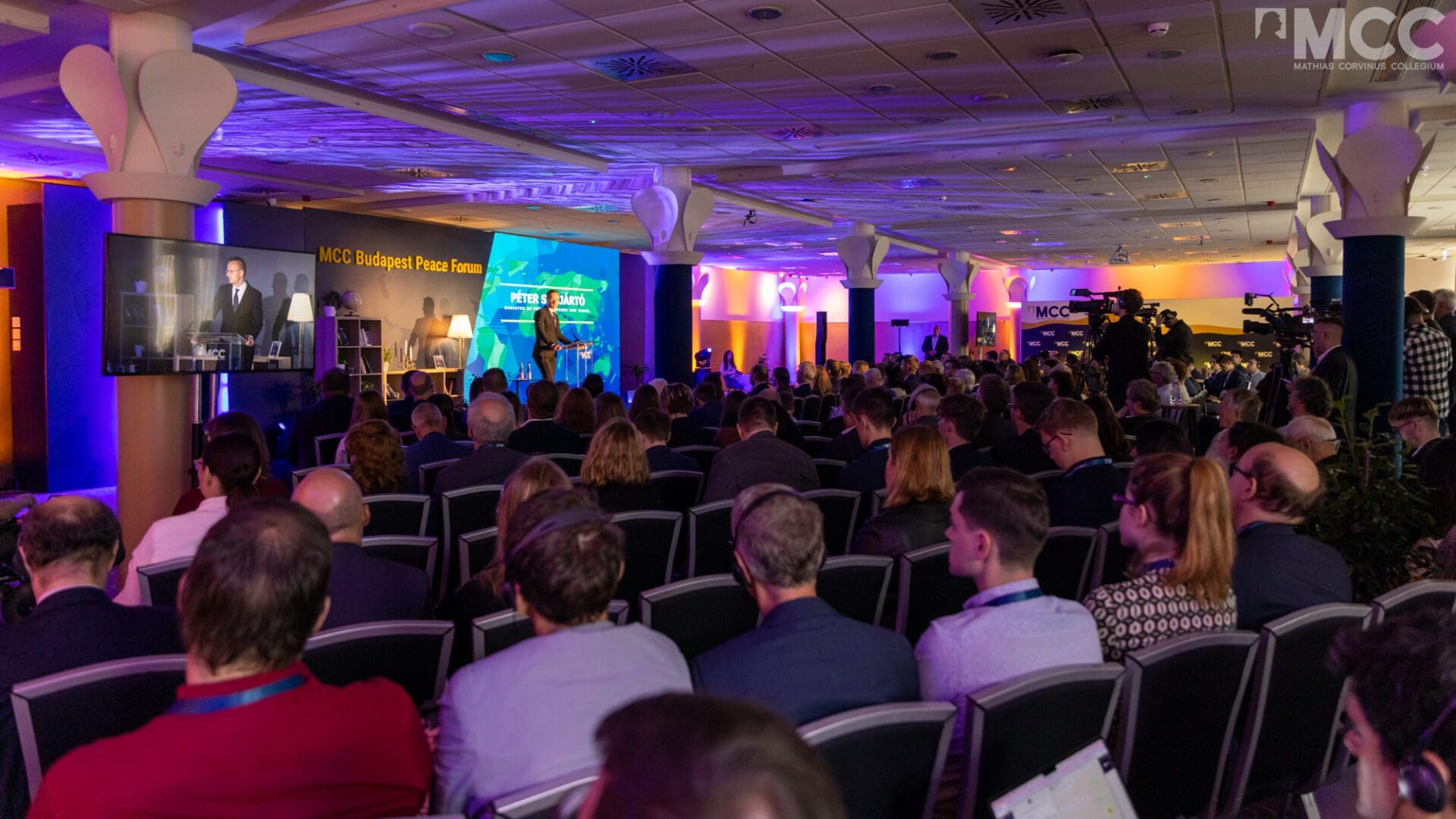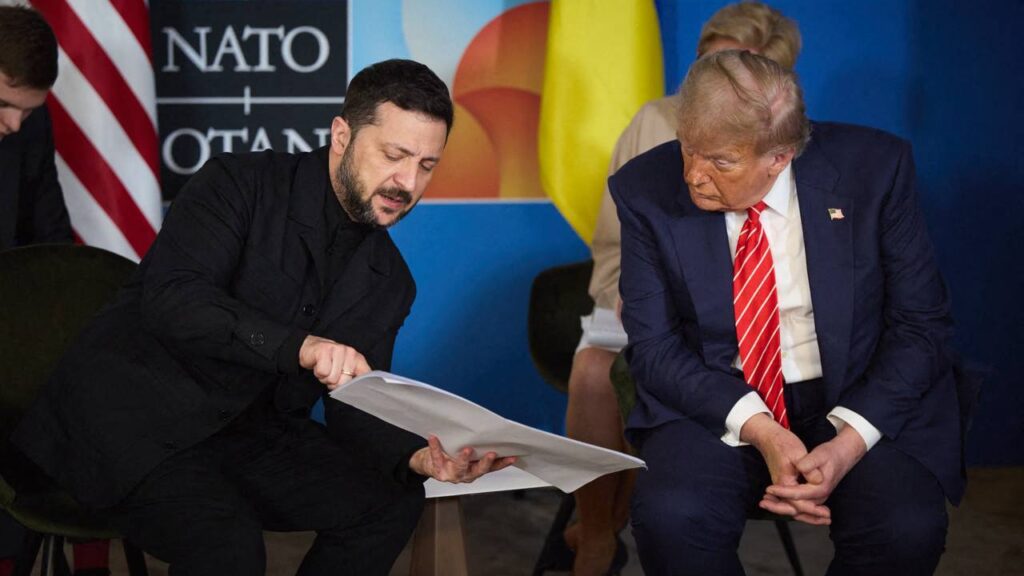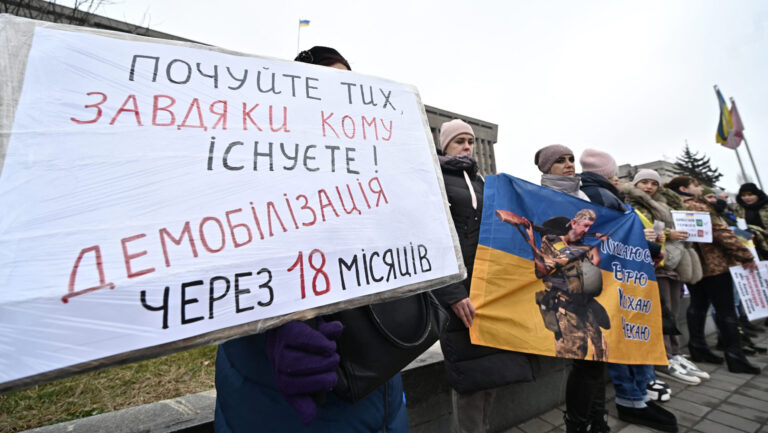The following reporting is based on a press release kindly provided by Mathias Corvinus Collegium.
‘The main goal of the Budapest Peace Forum, organised by the Mathias Corvinus Collegium, is to show the world from all possible angles why it is in the essential interest of Europe to have a peace agreement as soon as possible’, MCC Director General Zoltán Szalai said in his opening remarks. The MCC Budapest Peace Forum was held between 7 and 8 June, with a series of insightful lectures and discussions with world-renowned experts, current and former politicians and media personalities.
In his opening address, Mr Szalai reminded the audience that MCC holds the issue of a promptly-made peace agreement especially dear because one of its campuses is located in the Westernmost part of Ukraine in the town of Beregszász (Berehove), where it is working to train the talented youth of the local Hungarian national minority.
Szijjártó: Only Peace Can Provide Security for Hungary
‘You cannot speak about peace in Hungary without courage, in certain countries, it is virtually impossible to do so in public’, the Minister for Foreign Affairs and Trade said in his speech. Péter Szijjártó praised MCC for having the courage to organise a conference with this level of expertise on display on the topic.
In criticising the policy of the European Union, the Minister pointed out that the EU got carried away with the ‘sanction-hysterics’, while also letting the United States provoke us into a contest to see who can give the most aid to Ukraine. Szijjártó also drew attention to the severe consequences of the war, the world segregating into blocs again. He emphasised that
the interest of Hungary is to have peace as soon as possible, as only peace can provide security for Hungary.
MCC’s Budapest Peace Forum continued with illustrious speakers taking a stand on the side of peace. The first panel featured Omar Ashour, a professor at the Doha Institute for Graduate Studies, Riva Ganguly, former state secretary at the Foreign Ministry of India, Kishore Mahbubani, Former President of the United Nations Security Council, Jeffrey Sachs, Director of the Center for Sustainable Development at Columbia University, and Frank Füredi, director of the MCC Centre in Brussels.
Building the Road to Peace
Jeffrey Sachs believes the 21st century is no longer the century of the United States. This is evidenced by the fact that Ukraine has been in a war-time crisis for nine years now, which has only deepened since. The professor reminded that Russia and Ukraine almost reached an agreement shortly after the war broke out through the mediation of Turkey, however, the US vetoed it. He thinks NATO should listen not only to the United States, but also countries like Hungary and Turkey, which are stressing the need for negotiations and peace. Sachs pointed out that he is on Ukraine’s side, but, contrary to the US’s position, supplying weapons does not bring peace, and thus it does not save Ukraine and the lives of the Ukrainian people.
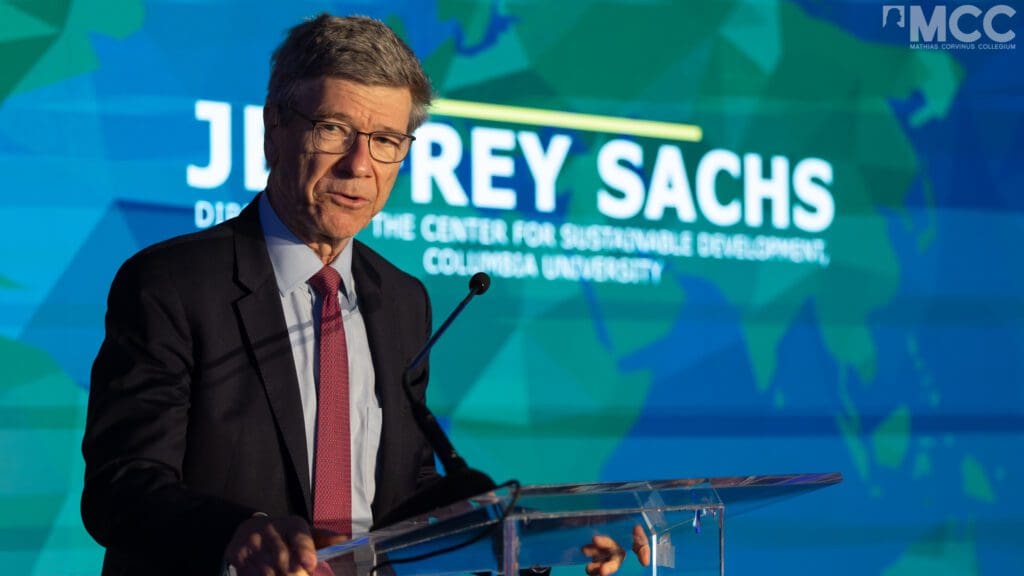
Omar Ashour stated that most peace treaties were broken in the last few decades. Initiating, and then maintaining peace is a major challenge. He believes that there is not a lot of peace today, but there are many initiatives. The professor warned that peace is expensive, but no more expensive than war.
Riva Ganguly noted that his country views global peace in a different light. India views the UN as the most prominent forum for non-belligerent solutions. However, the UN should be reformed, as it no longer reflects the current state of reality, rather, its state after World War II, he added. He then pointed out the war has an effect on Asia as well, as the majority of the world’s population lives on this continent, therefore keeping peace and stability is especially important there.
Former UN Security Council President Kishore Mahbubani spoke in a short video message. He wished the forum good luck, since the world is in a tremendous need for a ceasefire. He went on to say that the G7 countries view themselves as ‘the guardians of the world order’, but their thinking is stuck in the previous century. Truth is, they are protecting the ‘old guard’, which is dangerous.
Frank Füredi thinks that the war is kept ongoing by opposing factors. The professor highlighted that the conflict is between Russia and Ukraine, and, in that sense, it is about sovereignty. Meanwhile, a proxy war is happening between NATO and the US, and Russia. Füredi believes that many in the West do not understand the importance f national interest, which could be an important incentive for peace talks.
How Is the War Changing the World?
In the second panel at the MCC Peace Forum, experts in the field were trying to assess the effect the war is having on the world.
Caroline Galacteros, President of GEOPARMA, believes unless the stance of the leading powers changes, the conflict cannot come to an end in the near future. As she pointed out, it is doubtful that Ukraine, with its depleted military, could ever retaliate against Russia to any meaningful degree even with NATO assistance. The war can come to an end if we remember Europe’s security is guaranteed by peace and mutual dependence, she went on to state.
According to Mohammed Ahmed Gain, President of the African Institute for Peacebuilding and Conflict Transformation, the world powers are stuck in the past. Their memories of violence is what start the war, thus a transformation is needed: instead of remembering the violence, let’s focus on peacefully forgetting, he added. He also believes that this war will have no winners, since the sides are fighting an unwinnable conflict, which has already frozen; and that Ukraine is only a puppet, acting in the interest of another power. In this sense, he is eerily reminded of the Cold War era.
President of the American Institute for Economic Research William Ruger thinks it is impossible to predict where new developments will be heading. As he emphasised, the war will be ongoing for a long time, as it is in many people’s interest to finance it. He also highlighted that we should command Ukraine for its courage and respect their right to national sovereignty. However, that does not mean that we should fund this bloodshed endlessly, and we must avoid a spiral of escalation.
Michael von der Schulenburg, a former senior German diplomat with the United Nations and with the Organization for Security and Cooperation in Europe (OSCE), cannot foresee peace in the near future either. He does believe that
a ceasefire can be made by the end of the year—not an official, rather, a de facto one.
However, the prospect of actual peace is still far away, but it still should be the main objective of our efforts. He is also of the opinion that it is unnerving that the sides have not been able to agree even on what this war is about.
Diplomacy Has to Understand the Essence of the Conflict and Must Take Human Loss Into Account
The Russia-Ukraine conflict is posing an unprecedented challenge to foreign diplomacy,
Suay Nilhan Acikalin, Vice Director of Graduate School at Ankara Haci Bayram Veli University stated. She believes the war substantially differs from the conflicts fought before, thus the academic literature on diplomacy does not offer any tangible solutions. Ms Acikalin drew attention to the power countries like Turkey could have as mediators. There is hope for the end to all this, however, that would require large-scale mediation, and not just between Russia and Ukraine.
International diplomacy must understand the essence of the conflict and different viewpoints, we can only base successful diplomacy to achieve peace on this, Arta Moeini told the audience when it was his time to take the floor. The Research Director for the Institute for Peace & Diplomacy is of the opinion that neither side is willing to do so, however. Many forget that the Russian and the Ukrainian–US are not the only two existing stances on the war—
there is also the one that 70 per cent of the world stands behind, which is a desire for peace.
We have seen many examples in history where two major powers fought each other in a third country, Joon Hyung, a professor at Handong Global University reminded all. He brought up his country, Korea, as an example. While there is a ceasefire there, there is no peace. He thinks that instead of territorial interests and division, we should focus on solving the core of the conflict.
The Media Plays a Key Role in Shaping Public Opinion on Peace and War
How should peace be talked about? This was the title of the fourth panel discussion at the MCC Budapest Peace Forum on day 1 of the conference. The main topic of the discourse was the question of how we should talk about peace, especially in the media; as well as where and who should talk about it at all. To what degree are certain opinions suppressed, and how one-sided is the approach of Western media? Whose interest is it to escalate and maintain the war, and why? What possible scenarios for peace are there? These questions were explored by Sohrab Ahmari, editor and founder of Compact Magazine, journalist-writer Thomas Fazi, columnist for UnHerd, Mátyás Kohán, journalist for Mandiner, and Zeyad Moustafa, editor of the Arabic newspaper Albayan. The discussion was moderated by Boris Kálnoky, leader of MCC’s School of Media
Mr Moustafa does not think we can talk about a win-win situation as even if Russia were to win militarily, it does mean they would win in an economic or humanitarian sense. According to his view, solutions to such problems can only be found through diplomacy.
Mr Fazi believes this war is actually fought between the United States and Russia, or between the US and the EU, in an economic sense. As he pointed out, the major powers should be brought to the negotiating table through stronger economic and international incentives.
Continuing the same line of thought, Mr Ahmari explained how the war is serving the interest of the American economy and the elite. While, theoretically, all people want peace, the American public is barely concerned with the war, since they have no personal connection to it. The economic elite, however, is watching on calmly and cynically, and is working on exploiting the situation for themselves to the fullest,
wanting to have China remain their lone competition by the end.
When asked by Kálnoky why we walk about peace so much when it is so difficult to do, Kohán voiced his opinion that there are nations whose national interest does not go against the war. What’s more, there are countries that are propagating the message that whoever is advocating for peace is actually on Russia’s side. He, however, believes that a pro-peace stance is not pro-Russian, it simply means that peace negotiations should start where the conflicting positions should be discussed.
Meanwhile, Fazi emphasised the role of the media: the Western narrative is giving a distorted picture of the situation, while also depicting Putin as a blood-thirsty dictator.
All panellists agreed that the media has a major effect on how the public gets informed about the conflict. It is by no means insignificant whether the press is pro-war and justified the weapon supplies sent, or puts the victims and the need for peace in the forefront.
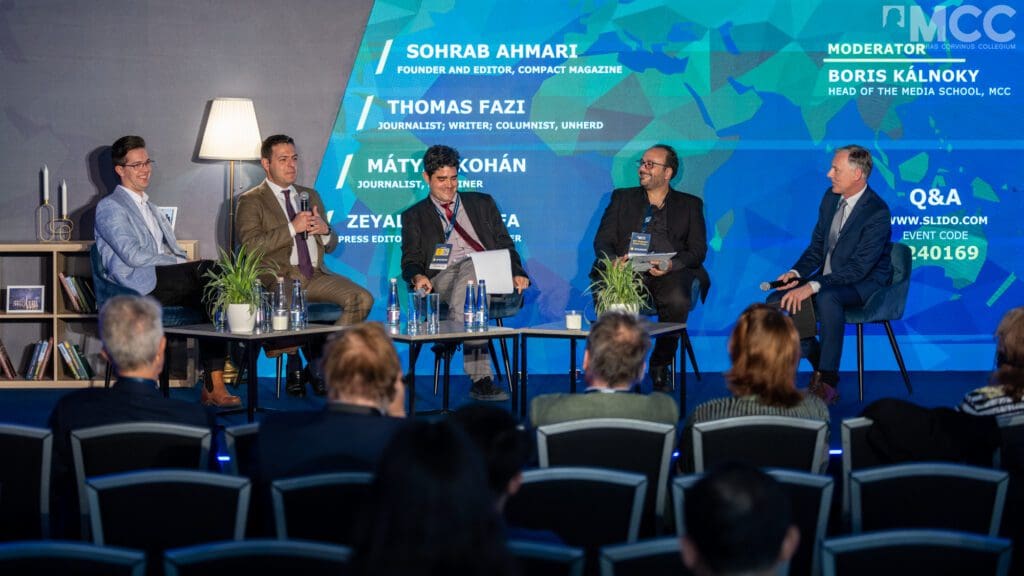
Human Sacrifice Should Be Minimised, This Is More Important Than Economic Interest
The energy price hike is a clear consequence of the war, Gladden Pappin, President of the Hungarian Institute for Foreign Affairs, stated. The American university professor also warned that the high energy costs put Western-European companies in a very difficult position, making them less competitive than their counterparts overseas.
Zoltán Ács, a professor at George Mason University and guest lecturer at MCC, agreed with his colleague from the US on the consequences of the war, however, he also noted it should be worth examining how much the world has spent on weapon shipments so far; while also reminding the audience that the war has affected Europe a lot more than it did the United States. To date, the US has sent about $50 billion worth of weaponry to Ukraine—however, this is just the first of the war, he added. Adding to the topic, Government Commissioner László György mentioned that the Hungarian economy is also taking a hit due to the Russo-Ukrainian war.
Tuomas Malinen, the chief director of GnS Economics, sees his home country, Finland’s NATO accession of Ukraine as a clear sign of escalation. In light of all this, the Finnish expert warns that
having an isolated cornered Russia on the world stage is in the interest of no-one.
He also talked about the increasing food prices in Finland.
Mr Pappin went on to emphasise that this war only has losers; what’s worse, it has set into motion certain processes the effects of which will only be felt later. Among the war’s consequences is the diminishing trust in the American Dollar, which can have unforeseen consequences in the US. Talking about a potential peace treaty, Mr Ács said it is an open question whether Russia would be brought back to the ‘bloodstream’ of world politics, adding that it is also unclear whether the hypothetical treaty would follow the Korean or the Vietnamese example. The main priority is to minimise human sacrifice, he stressed.
Defining the Areas of Influence Is Key To Making Peace
We are seeing a war of spheres of interest and influence, Zhou Bo, a leading researcher at Tsinghua University stated at the discussion closing Day 1 of the MCC Budapest Peace Forum. He went on to say that Russian, American, Asian, and European interests are competing with each other on the Ukrainian battlefield.
To this, Maria Engstrom, a professor at Uppsala University responded by saying that in the cases of these spheres of influence, we are not talking about states, rather, whole regions. She also mentioned that this war has cultural and societal roots as well.
Michael A. Reynolds, Associate Professor of Near Eastern Studies at Princeton University, brought up a historical parallel. He talked about how the Cold War could remain ‘cold’ in Europe because the major powers—for whatever reason—respected each others’ spheres of influence. He also believes that the roots of this conflict can be traced back to these different spheres of influence being pinned against each other.
Viktor Eszterhai from the Hungarian Institute for Foreign Affairs also put the war into a historical aspect. As he pointed out, after the Cold War, the bipolar world became unipolar, while the current war is a result of multipolarisation. Eszterhai believes new actors, namely Russia and China, are vying for major-power status, thus the redivision of the spheres of influence is happening right now.
Mathias Corvinus Collegium on X (formerly Twitter): “We are currently witnessing a battle of interests and spheres of influence, said Zhou Bo, discussing new #spheres of #influence with @MashaEngstrom, Michael A. Reynolds, Viktor Eszterhai & Bálint Somkuti. In Ukraine, Russian, American, Asian and European interests collide. pic.twitter.com/2A346TVcHg / X”
We are currently witnessing a battle of interests and spheres of influence, said Zhou Bo, discussing new #spheres of #influence with @MashaEngstrom, Michael A. Reynolds, Viktor Eszterhai & Bálint Somkuti. In Ukraine, Russian, American, Asian and European interests collide. pic.twitter.com/2A346TVcHg
The participants agreed that the respective spheres of influence and interest should be discussed by the world powers at the negotiating table. Without that happening, there cannot be long-lasting peace.

